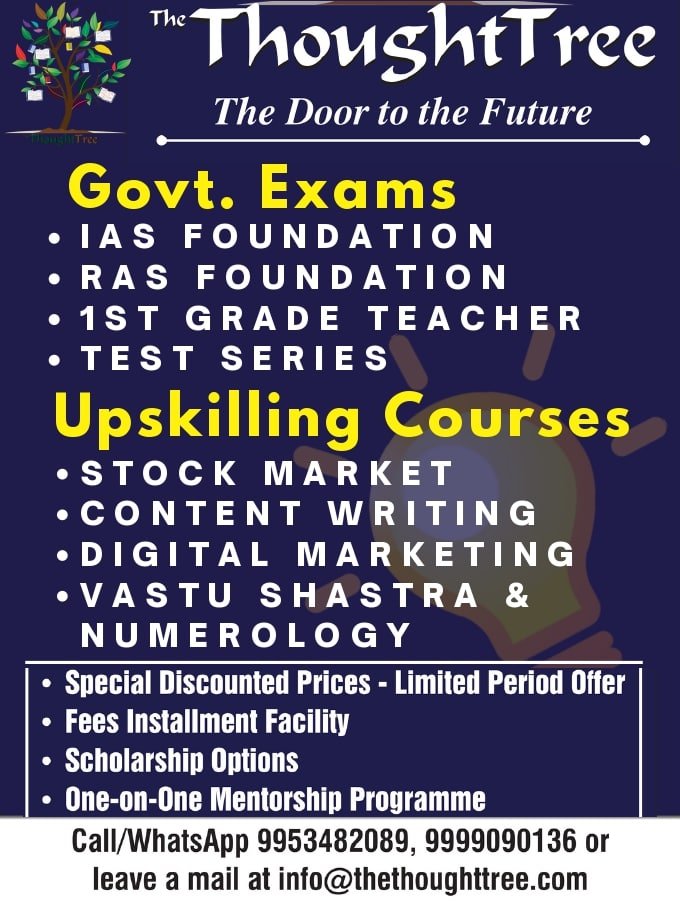The Indian Administrative Services, or IAS, is a highly sought-after position in India. To get a position in the top bureaucratic agencies that assist in governing the nation, lakhs of people prepare themselves year after year. Through the Union Public Service Commission (UPSC), you could be an Indian Administrative Officer. UPSC CSE exam is used to select officers for the country’s civil service, including the IAS, IPS, IFS, IRS, and many more. Of all the services available, the IAS is the most sought and esteemed.
So before asking how to become an IAS officer, you need to ask yourself why you want to become an IAS officer?
Studying for the civil services examination is time-consuming since it consists of three stages and many aspects, unlike some other competitive reviews. Therefore, before embarking on this trip, you must determine if it is what you want. Ideally, if serving your nation and being a system component to effect good change is your heart’s desire, you should pursue the IAS as a career choice. It is hard, but it can be rewarding. You may become India’s Cabinet Secretary. Apart from career possibilities and benefits, you may join the hall of fame of all those commanders whose names inspire pride in every Indian.
[content_ias_cta]
Brief about the UPSC CSE Exam
Every year, the UPSC publishes a notice seeking applications in January or February, and the first stage, or preliminary examination, is typically conducted around the end or beginning of May. Three stages of the Civil Services Examination are conducted by the UPSC which are –
1. Preliminary Exam
2. Mains Exam
3. Interview
A candidate has to qualify for all these exams to become an IAS Officer. So before knowing how to become and IAS Officer, let’s understand how the exam happens and the pattern of the UPSC CSE exam.
We at The Thought Tree provide the best and most effective UPSC preparation strategy to our students. We have the best teachers, and we believe in providing mentorship to our students so that they can clear the exam in the first attempt. So join The Thought Tree for the best UPSC coaching in Jaipur. We also provide online classes for USPC preparation.
Who Conducts the IAS Exam in India?

The Indian Administrative Services, or IAS, is a highly sought-after position in the country. To get a position in the top bureaucratic agencies that assist in governing the nation, lakhs of people prepare themselves year after year. Through the Union Public Service Commission (UPSC), you could be an Indian Administrative Officer. This examination selects officers for the country’s civil service, including the IAS, IPS, IFS, IRS, and many more. Of all the services available, the IAS is the most sought and esteemed.
The 3 stages of the IAS exam are
1. Preliminary exam
2. Mains exam
3. Interview
A candidate has to qualify for all these exams to become an IAS officer. So before knowing anything else, Let’s understand how the IAS exam happens and what the pattern of the UPSC Civil Services Examination.
1. Preliminary Exam
MCQ Exam
| EXAM | TIME | QUESTIONS | BRIEF TOPICS | Marks | MARKS NATURE |
| General studies I | 2 hours | 100 | History, Polity, Geography, Science, Economics, Current Affairs, etc. | 200 | The score will be taken into account for determining the cut-off point. |
| General studies II | 2 hours | 80 | Mathematics, Logical Reasoning, Reading comprehension, etc. | 200 | To qualify for the CSAT, candidates will need to get a score of 33 percent out of 100. |
2. Mains
This is a subjective paper with 3 hours of time for each paper.
| EXAM | TOPIC/SUBJECT Total Marks |
| Paper A | Any Indian Language you choose 300 |
| Paper B | English 300 |
| 1st paper | Essay 250 |
| 2nd paper | GS Paper 1 – Heritage, Geography, History, 250Culture |
| 3rd paper | GS Paper 2 – Governance, Constitution, Social 250Justice |
| 4th paper | GS Paper 3 – Disaster management, 250Environment, Technology |
| 5th paper | GS Paper 4 – Ethics, Integrity and Aptitude 250 |
| 6th paper 7th paper | Optional – Paper 1: 250 Optional – Paper 2: 250 |
3. Interview
Once candidates have passed both the objective and subjective exams, they are qualified for the final interview. As part of the interview, the candidate’s subjective personal skills and mental abilities are assessed. Only a few of the applicants made it to the finals. Once the applicant has passed all the qualifying exams, training is done at LBSNAA, and they become an IAS officer.
Eligibility Criteria to Become an IAS Officer
Candidates for UPSC Civil Services should be Indian citizens and have finished their degree (any degree) from a recognized institution. They must also be between the ages of 21 and 32 years.
Age is determined as of the notification year’s 31 August. The upper age restriction is also loosened per government regulations for the reserved groups. If you want to clear in the exam, all the IAS exam eligibility criteria must be fulfilled.
What does an IAS Officer do?
In the simplest terms, an IAS official helps the governing government in formulating and administering its policies. Additionally, they are accountable to execute policies and give input to the relevant ministry on the progress and consequences of implementation.
IAS officers are accountable to Parliament and state legislatures for distributing money in their districts, maintaining peace and order, disaster response, and tax collection, among other responsibilities. They begin their careers with sub-divisional level responsibilities.
IAS officers are appointed as District Magistrate, Collector, or Commissioner at the district level. They may work alongside senior IAS officers in a State or Center appointed as Cabinet Secretary or as Joint Secretary, Deputy Secretary or as Deputy Secretary of State. Additionally, they may act as Heads of Departments for a variety of Public-Sector Entities. The position involves enormous responsibility and a once-in-a-generation chance to better society in general.
Read More: Life of an IAS Officer
As an IAS officer needs to know about the practicalities of the society, it is important to keep in touch with the people and organisations around you. T3, in their IAS coaching has a Quarterly #giveback program, organises field trips to NGOs and other such organisations which helps aspirants to understand more about ground level realities of the society. This not only helps in exams but also after you become an IAS.
Tips to Become an IAS Officer
The real solution to ‘how to become an IAS officer’ begins with your preparation plan! Preparation for the Civil Services exam typically takes between 8 and 12 months. As a result, you should start planning about a year in advance to prepare the whole curriculum holistically. The following are some fundamental measures to take in preparing for the Civil Services exam.
1. Confidence

Have confidence in your skills and abilities. Having doubts about your abilities serves to erode them. If you follow the correct approach and combine it with relentless work, you will achieve the required results and get admission to the illustrious Indian civil services.
2. Keep up with the Latest News

Newspapers are your most important asset as an IAS applicant and students must know how to read newspaper for IAS. One of the most challenging aspects of current events is that the UPSC curriculum changes daily due to this element. Every day, there is a new subject of interest in both the international and domestic spheres. Aspiring IAS candidates must establish a regular reading routine that includes newspapers. Still, they should also maintain an acute awareness of key subjects likely to be included on the exam.
3. Mock Exams and Practice Writing Answers

Mock exams and essay writing are the two most critical components of UPSC preparation. Without these, you cannot finish your UPSC preparation! While mock tests enable you to analyze your preparation and get insight into your problematic areas, answer-writing practice allows you to hone your writing abilities and improve your answer-writing methods. As a result, include both in your preparation.
You can join a coaching center for this. It is advisable to join T3 where they have retired government employees as faculty. They also provide the best reading material. They even keep their lectures dynamic keeping the socio-cultural and political scenario in mind.
4. Read Popular Reference Books

Now, the first concern that may occur to you is, “What are the recommended books for UPSC preparation?” Thus, “standard literature” refers to works that must be read to cover and understand a particular topic. Read NCERT books of class 6th to 12th and make sure that you read other reference books also. Please make a list of all the essential books and begin reading them.
5. Create an Effective Study Strategy

This is the moment at which you begin studying. You will be required to spend lengthy periods of time at the study table. However, ensure that you take necessary pauses. Prevent burnout. A structured strategy may help you navigate the IAS preparation process smoothly. Develop a distinct approach for each stage, namely the UPSC preliminary examination, the UPSC main examination, and the UPSC interview. The Thought Tree provides you with tried-and-true strategies and subject-specific notes to make your work simpler!
Additionally, we concentrate on current events. You must pay close attention to this part if you want to become IAS officers. You must read daily newspapers and major publications such as Yojana and PIB updates to comprehend and analyze any news of national significance politically, economically, or socially. It has several areas dedicated to assisting you with your current affairs preparation. Consider checking out daily news commentary and other topics such as the PIB nutshell, Yojana nutshell, or the issues covered on Rajya Sabha TV nutshell.
6. Spend Time Online Productively

Technology has also made inroads into the world of IAS exam preparation. The ease with which material is available and accessible at the press of a button is a significant advantage for any IAS applicant. Thus, it may provide access to high-quality preparatory materials for individuals who reside geographically distant. Additionally, smart use of the Internet may assist most applicants in gaining access to the most pertinent material for the IAS Exam.
For instance, you may use the Internet to learn about toppers’ methods that helped them pass the exam. Additionally, the Internet may assist you in retrieving notes from many sources of knowledge.
The appropriate platforms may assist you in supplementing your preparatory work. You may obtain vital information by consulting the government and other authoritative websites like PIB, PRS India, MEA, and NITI Ayog.
7. Keep Revising

Revision is also an essential component of UPSC preparation. Multiple revisions of the material examined are necessary for idea retention. We tend to forget dates and events in General Studies, which is why it is critical to review them many times to solidify those ideas in your memory.
Conclusion
You have a long and challenging journey ahead of you to achieve your IAS dream. Protracted and challenging, but not unachievable. Your resolve is critical in this. Throughout this trip, the candidates will encounter many obstacles that will put their confidence in themselves to the examination. Some quit in the process of pressure from family members and some due to financial constraints. Nonetheless, for every loss, there is a triumph. While those who succeed credit their accomplishments entirely to their determination.
If you enroll yourself in T3’s IAS coaching, you don’t have to worry a lot about the financial aspect as they provide scholarships for EWS. They also let you pay in installments. So with best guidance and mentorship, you can go ahead to pursue your dream of becoming an IAS.
The path to success is paved with great diligence, unwavering commitment, and near-superhuman reasoning, remembering, and analytical skills. As a result, to become an IAS officer requires nearly supernatural skills, earning them the moniker “heaven-born.” Perhaps it has something to do about the fact that they bear the burden of making our community a better place for everyone. Therefore, if you believe you have it, give it a try (or maybe 5 more!), and perhaps you will have the opportunity of becoming the next Magistrate who might just cut the ribbon to the new hospital you campaigned in your region.
Some FAQs
- What UPSC optional subjects must I take?
Ans. A few things to consider while choosing an optional paper are: a basic understanding of the subject, previous records based on UPSC assessment, interest and academic status, easy availability of learning resources for the subject, and external assistance/coaching accessible for the subject.
2. Can I select an optional subject that I did not study during my graduation?
Ans. Yes, you may choose a topic for the optional exam even if you did not study it during your graduation or other comparable degrees.
3. Where can I get exam preparation study materials?
Ans. The curriculum for the civil services exam is extensive, and the best study material is required to prepare for and ultimately pass the exam. Books, video lectures, notes, and study materials are readily accessible online and offline. But it is always better to join good IAS coaching and stick to their material plus one or other sources.
4. Can I become an IAS in a year?
Ans. As it is said that nothing is impossible, you can become an IAS officer with one year of preparation. There are a lot of people who worked hard for a year and achieved their goals. You can also do it. All it takes is proper mentorship and utmost dedication. I suggest you join T3 as we provide the best guidance, mentorship, and a friendly learning environment.





